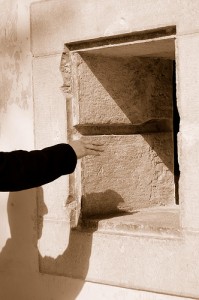Saturday
Community Articles, Dharma TeachingsThere Will Be Mishaps
By Walt Hernandez
One of the Kagyu mystics once said, “Being in the Kagyu tradition, the Kagyu lineage, is like inheriting constant mishaps. Constant mishaps. That’s true. If you are actually in contact with reality, and particularly if you are in control of reality, then you are in contact with completely constant mishaps. Because you are in contact and in control, therefore the mishaps begin to come to you rather than you bumping into them. They begin to come to you constantly. These little things are taking place all the time. Fantastic. Delightful. And it is that which makes everything very cheerful.
— Chogyam Trungpa, from The Mishap Lineage
On the last week of dathun our leader, Esther Rochon, told us about mishaps. As we readied ourselves to leave the remote valley in Vermont where we sat in daily meditation, the uncertainty of reentering the world and returning to our lives became a source of concern and worry for some of us. The transition from daily meditators in a quiet center nestled in the mountains to the busy lives we lead in cities could be a jarring experience, she warned. Adjusting to busy schedules, city life, friends and partners, and demanding work environments could easily disrupt the sense of open space we’d learn to appreciate during our silent, introspective days in Karmê Chöling.
“Expect mishaps to happen,” Esther said with a gentle smile. “Expect little things to trip and make you lose your balance when and where you least expect them. You don’t have to go looking for or encourage these mishaps to occur; they will come and find you.” Then she laughed, and she related her personal experience with mishaps and events she met with after attending previous retreats.
Mishaps are occurrences, big or small, that jolt us back to the present moment. They can be small, annoying, and unexpected events that make us realize we are not paying attention to what is happening to us at the moment. A mishap can be as simple as dropping and breaking a glass or as life changing as losing a job or relationship. In a sense, they’re situations that make us pay attention to what is happening in our lives that we would otherwise take for granted. Mishaps bring our minds back to our body and remind us that the present moment is the only place we should dwell in so that we may practice meditation in action.
Just like in meditation, the instruction for handling mishaps is not so much to reject what is happening as to watch the situation unfold and, if possible, accept and embrace it. Like thoughts that arise while we sit on a cushion, a mishap is neither inherently good nor bad. Rather, it is a series of conditions coming together at one particular moment that begins to dissolve the next. Some mishaps last longer than others; others may be harder to accept or contend with. Some situations demand our immediate attention and elicit some form of response from us the moment they occur. Others, while annoying, will vanish after some time like a cloud moving across the sky. The more stubborn ones will insist on remaining and making a place for themselves in our home. Regardless, mishaps are as much a part of our daily lives as breathing or paying bills. How we regard them and choose to handle them is what makes them either a nuisance or an opportunity for growth.
For me, mishaps began as soon as I returned to New York. The morning after my arrival the coffee maker decided to give up on me and died. Anyone addicted to the first cup of coffee in the morning knows this was not a mishap but an emergency. Without my morning jolt of caffeine, I’m useless for the remainder of the day — coffee means the difference between being awake or fumbling along through the day. With my coffee maker out of commission, I felt like a marathoner running without shoes on a pebbled beach. I hobbled along until I was able to buy a replacement that works better than the old one and brews a cup of coffee in less than ten-seconds. Since I started using the new machine, I’ve gained a sense of appreciation for each and every cup of coffee I brew, enjoying each cup with a sense of gratitude I didn’t grant the previous ones.On the second week after dathun, I received a call from my mother telling me my grandfather died. Having barely begun to settle at home after being away for a month, I found myself packing my bags again and flying to South Florida for the funeral. My grandfather’s death brought to mind one of several contemplations we practiced while at dathun: impermanence. Contemplating death is a Buddhist practice that helps us appreciate the preciousness of our human birth. While we may not like to think about our mortality or ponder how or when we will come face-to-face with it one day, my grandfather’s passing brought that reality up for me.
My grandfather was a quiet, reserved man. He was the type of person who liked to tinker and unravel how things work. He could take an engine or watch apart and put it together without reading a manual or instruction book. My grandfather taught himself to draw; he learned to photograph and record films on his own; and he built the first airplane built in Cuba in his house garage. Of all my relatives, I inherited the most personal traits from him. My curiosity, artistry, and temper all come down from him. His passing left a deep void in my heart I’m having difficulty trying to live with. When I think about losing my grandfather, I feel as if I’ve lost a limb, or like a part of me is missing. While at the funeral, I realized how important every day and every breath is; how precious every moment we have is to enjoy and appreciate. I miss him very much, and not a day has passed that I don’t think about him or feel his presence around me when I sit to meditate or work at my computer.
The mishaps continued after my return from Florida when I found out that my unemployment benefits had run out. Reading the letter from the NY Department of Labor left me feeling like I had now fully reentered the world. As I folded the letter and put it back in the envelope it arrived in, dathun seemed like a distant memory. Were it not for the photos and e-mails I receive from other dathun participants, I would think it was all a dream. Suddenly, finding a job has taken on an urgency bordering on emergency, and I realized that if I want to remain living in New York City, I have to move quickly and with certainty in finding a way to earn a living. The alternative is to pack my belongings when my current lease expires in October and return to Florida to live with my parents until I’m able to get back on my feet.Not too long ago I wrote about groundlessness for the Shambhala Times, the bardo of unemployment, and feeling like the ground I walk on has been pulled from under my feet. This past weekend, during my weekly dharma practice gathering at QueerDharma, I told a friend I felt as if I was free-falling toward an uncertain future. Everyday is an exercise in resilience and exertion, two necessary traits for any spiritual warrior. Though I have no idea what the future holds and where I’ll find myself in the coming weeks, what remains true and what I hold most dear is my meditation practice.
“Were it not for my time sitting on the cushion,” I told my friend, “I would have lost my mind a long time ago. Meditation is what’s keeping me sane at this moment.”
In The Mishap Lineage, Chogyam Trungpa teaches that these mishaps — confusion, chaos, and emotional upheavals — can be regarded as fuel for the spiritual journey. Citing the lives and examples of the Trungpa tulkus, of which he was the eleventh incarnation, Rinpoche relates how these meditation masters turned adversity and difficult moments in their practice into a path of bodhi. The stories in the book illustrate that life’s ups and down are not exclusive to a particular individual. Rather, they’re a part of our lives and we should invite them to challenge us to further our practice and understanding of how our mind works.
As we stumble or feel the pressures of a difficult day, month, or year we’re actually joining and connecting with a lineage of courageous men and women who view adversity as a way to further their practice and develop compassion. Mishaps are events that keep us connected to everyone around us. They’re life’s constant reminders of why we sit and practice meditation, serving as an invitation to take our seats every day. When we learn to welcome uncertainty in our lives and regard whatever mishaps arise as nothing other than companions along the path of meditation, we’re walking the same path the Trungpa tulkus walked before us, and we become joyful members of the lineage of mishaps.
________________________________________
 Walt Hernandez is a freelance essayist and travel writer. He’s been a member and practicing Shambhala Buddhist since 2006, and practices with QueerDharma on Sunday evenings. He currently lives in New York City.
Walt Hernandez is a freelance essayist and travel writer. He’s been a member and practicing Shambhala Buddhist since 2006, and practices with QueerDharma on Sunday evenings. He currently lives in New York City.







